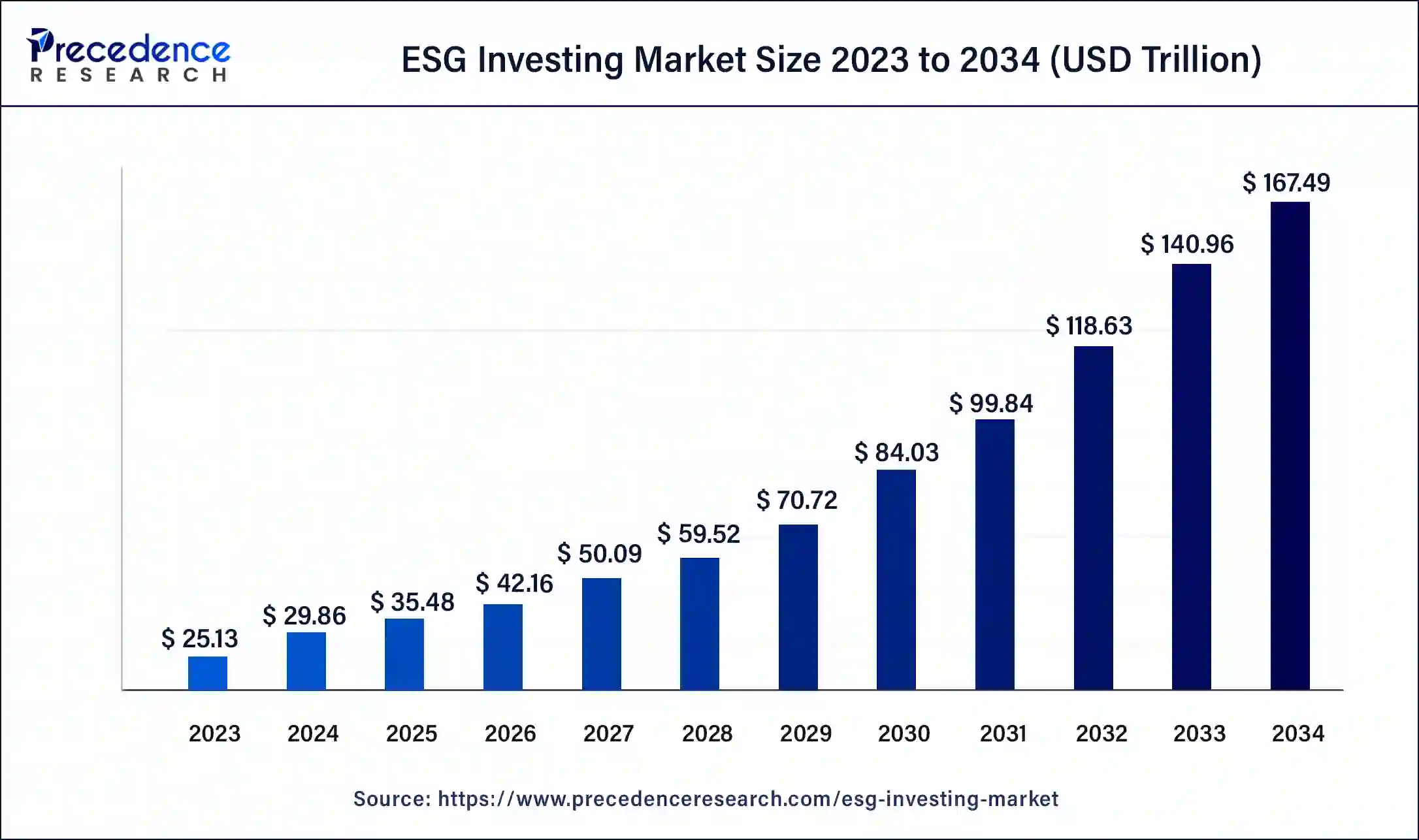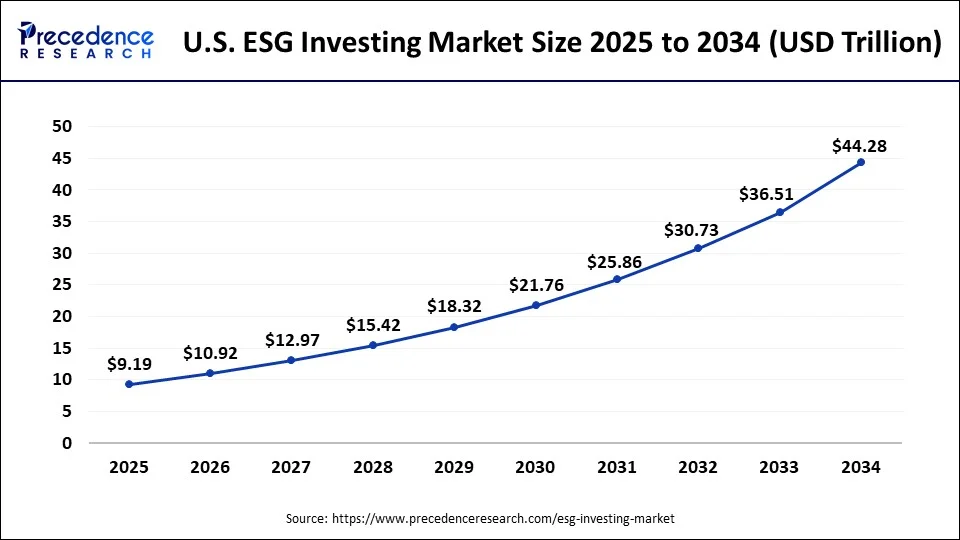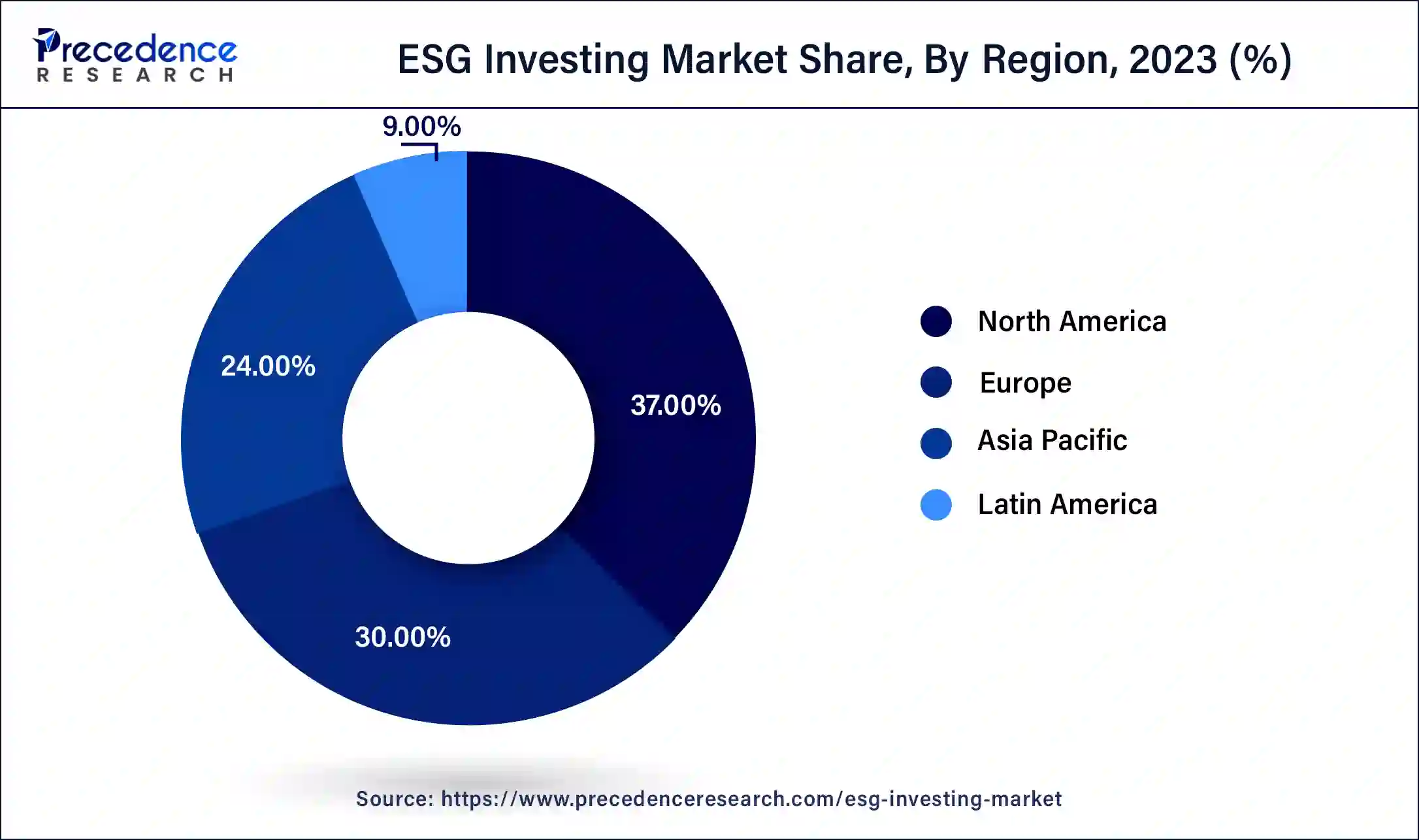ESG Investing Market Size and Forecast 2025 to 2034
The global ESG investing market size was valued at USD 29.86 trillion in 2024, and is expected to reach at USD 167.49 trillion by 2034, at a CAGR of 18.82% from 2025 to 2034. The North America ESG investing market size reached USD 9.30 trillion in 2023. Companies' rising awareness of environmental and social practices attracts investors, which drives the growth of the market. Governments across the globe have also developed SDGs in order to make the world more sustainable.

ESG Investing Market Key Takeaways
- In terms of revenue, the ESG investing market is valued at $35.48 trillion in 2025.
- It is projected to reach $167.49 trillion by 2034.
- The ESG investing market is expected to grow at a CAGR of 18.82% from 2025 to 2034.
- North America dominated the market with the largest ESG investing market share of 37% in 2024.
- Asia Pacific is expected to grow at a Double digit CAGR of 21.52% during the forecast period.
- By type, the ESG integration segment held the highest market share of 36% in 2024.
- By type, the green bonds segment is anticipated to have the fastest growth in the market during the forecast period.
- By investor type, the institutional investors segment contributed more than 57% of market share in 2024.
- By investor type, the retail investors segment is expected to have significant growth in the market during the predicted period.
- By Application, the environmental segment dominated the ESG investing market with the largest market share in 2024.
- By Application, the integrated ESG segment is projected to have the fastest growth in the market during the forecast period.
How Can AI Impact the ESG Investing Market?
Artificial intelligence significantly impacts the overall management and performance portfolio of ESG investing positively. The integration improves the financial outcome and decision-making process. With the use of machine learning algorithms and advanced analytic data, AI helps investors analyze ESG datasets, extract actionable insights, and identify potential investment opportunities. AI helps investors to disseminate ESG-related data to make informed decisions regarding their investment that align with sustainability goals and values. AI helps to drive a positive impact on environmental and social investment while gaining significant financial returns. Thus, the integration of AI into ESG investing opens unprecedented opportunities to address complex ESG processes and achieve successful financial returns.
- In November 2023, Nasdaq, a capital markets technology and exchange company, launched the AI-enabled SaaS platform Nasdaq Sustainable Lens, designed to help investors utilize and navigate ESG data from several companies.
U.S. ESG Investing Market Size and Growth 2025 to 2034
The U.S. ESG investing market size was exhibited at USD 7.73 trillion in 2024 and is projected to be worth around USD 44.28 trillion by 2034, poised to grow at a CAGR of 19.04% from 2025 to 2034.

North America dominated the market with the largest market share in 2024. The growth of the market is attributed to the rising interest in ESG investment among retail and institutional investors due to the higher return from it. The rising concern over sustainable products and services is driving investors in ESG investing, and the rising concern over sustainable practices in investment is collectively driving the growth of the market. Additionally, the increased availability of the major industries and the developed economies, including the U.S. and Canada, is collectively driving the growth of the ESG investing market across the region.
- According to the survey of the C-suite and the functional leader involved in ESG, 71% strongly believed and agreed that the role of ESG in the corporation will increase in the future. 60% of supporters agree that companies investing in ESG are gaining competitive advantages. 91% currently use third-party solutions for the management related to the ESG.

Asia Pacific is expected to have significant growth during the forecast period. The growth of the ESG investing market is owing to the rising economic development and the rising concern over the environment, as well as sustainable development, which drives the growth of the market. The rising population and industrialization result in increased cases of environmental challenges that create opportunities for sustainable products and services, which boosts the growth of the ESG investing market in the region.
The market has two major regions dominating the ESG investing market. Currently, Europe and North America are competing in the race for development and initiatives to achieve the first position in the market. The demand for clean energy is boosting businesses and projects.
Market Overview
ESG investing is the investment in the purpose of making the world a more sustainable and better place to live. ESG investing is an investment in companies with the purpose of increasing their performance and benefitting the environment. The ESG stands for the environmental, social, and governance. ESG investing is buying a share of a company that is willing to work in this field. This is the ethical type of investing by the investors with personal choices and values.
The criteria of ESG are how public companies maintain their environment and communities' work and ensure that management incorporated with governance meets high standards. The rising urbanization and economic development in the countries are driving pollution and negatively impacting global warming, which drives companies to act and implement projects.
Technological Advancement
Technological advancements in the ESG investing market feature blockchain technology. Eventually, the market adopted limited but beneficial technology to establish the narrative of change and challenges to incorporate accordingly with advancements. The latest advancement enhances stakeholder engagement and improves decision-making. The blockchain technology provides transparency in data processing by delivering records of ESG data. This strengthens and encourages trust and safety to lock the deal.
The technology has also contributed to improving, collecting, and monitoring the ESG performance. This supports the supply chain ecosystem. The innovation in the ESG investing market will reshape and accelerate the development of projects. This will also expand the market with new engagements.
ESG Investing Market Growth Factors
- The increasing awareness among investors in their investment choices and the rising concern over sustainable practices due to rising urbanization, environmental degradation, and social issues are driving the growth of the ESG investing market.
- Rising concern over climate change, natural calamities, and environmental issues accelerates the organization's need to take appropriate action to mitigate risk, which can attract retail and institutional investors to the market.
- The integration of the ESG portfolio with the company's results in improved financial performance, such as total shareholder return, return on equity, and risk adjustment returns, which collectively contributed to the growth of the ESG market.
- ESG investing is already outperforming in the market, with the increasing demand from investors for companies to improve their ESG performance. The ESG funds are outperforming traditional funds in several asset classes.
- Due to its growing nature, investors are increasing their interest in sustainable and pollution-free products and services, driving the demand for the ESG investing market.
ESG Investing Market Trends
- In February 2024, the Ministry of Environment and the United Nations Development Programme (UNDP), in collaboration with Cedar Oxygen SAS, launched the Lebanon Green Investment Facility (LGIF). This financing facility aims to develop climate adaptation and mitigation efforts in Lebanon.
- In July 2024, Fidelity, an investment management company, updated its sustainable investment framework with the launch of a 3-tiered system categorizing funds with their ESG integration level for catering to the rising number of ESG clients and regulatory landscape.
Market Scope
| Report Coverage | Details |
| Market Size by 2034 | USD 167.49 Trillion |
| Market Size in 2025 | USD 35.48 Trillion |
| Market Size in 2024 | USD 29.86 Trillion |
| Market Growth Rate from 2025 to 2034 | CAGR of 18.82% |
| Largest Market | North America |
| Base Year | 2024 |
| Forecast Period | 2025 to 2034 |
| Segments Covered | Type, Investor Types, Application, and Regions |
| Regions Covered | North America, Europe, Asia-Pacific, Latin America, and Middle East & Africa |
Market Dynamics
Drivers
Benefits associated with ESG investing
The rising investment in ESG investing positively impacts environmental factors and sustainability. The ESG funds are accelerating the investment in clean energy development and other sustainable technologies. It helps enhance corporate diversity and inclusion, reduce industrial greenhouse gas emissions, navigate positive screening, and provide other benefits with the evaluation of ESG investing, which drives the awareness among investors to invest in ESG.
Restraint
Lack of data availability
The insufficiency in the availability of standardized ESG data across industries and companies makes it difficult for investors to compare and analyze the ESG performance of different companies, limiting investment in the ESG companies that restrain the growth of the ESG investing market.
Opportunity
Emerging field that positively impacts the financial market
ESG investing is one of the significant evaluations in the financial market that helps investors enhance their financial return. ESG allows investors to generate potential financial returns by supporting the sustainable business. The adaptation of ESG investing increases reputation, reduces risks, and attracts and retains top talent. It is transforming the financial landscape, and rising concerns over the environmental, social, and governance criteria in the investors are driving the opportunity.
Type Insights
The ESG integration segment held the largest share of the ESG investing market in 2024. The increasing inclination towards ESG integration and the integration of ESG in decision-making provides several benefits, such as performance, risk management, reputation, and compliance. The ESG integration is suddenly gaining popularity due to the rising concern over the environmental, social, and governance factors that can financially affect the performance of a company and its risk profile. There are increased cases of investors focused on ESH integration into their decision-making and investment analysis process to increase return and mitigate risk more efficiently.
The green bonds segment is anticipated to have the fastest growth in the ESG investing market during the forecast period. The green bond is alternately known as the climate bond. The green bond issue organization issues debt security for financing and refinancing environmentally beneficial projects. The green bond offers attractive tax incentives to attract investors. Green bonds can used in financing several types of projects, including renewable energy projects, energy efficiency projects, natural resources and land management projects, pollution prevention and control projects, clean transportation projects, green building projects, and wastewater and water management projects.
- The government of India issued sovereign green bonds worth Rs 200 billion in four parts of Rs 50 billion in 2023-2024. The year 2023 is an important year for India's green bond market, with the issuing of its first tranche of a sovereign green bond worth Rs 80 billion in January 2023. The government is planning to raise investment through green bonds to finance public sector projects in renewable energy, energy efficiency, and other green infrastructure.
Investor Type Insights
The institutional investors segment dominated the ESG investing market in 2024. The institutional investor is the organization or firm that invests in certain projects on behalf of the individual person. It is often known as the Wall Street. Institutional investors significantly buy and sell blocks of bonds, stocks, and other securities. Insurance companies, pensions, and mutual funds are some of the examples of institutional investors. Institutional investors have a less regulatory framework and are considered easy as compared to the average investor.
The retail investors segment is expected to have significant growth in the ESG investing market during the predicted period. Retail investors are also known as individual investors who buy and sell funds, securities that consist of a wide range of securities like exchange-traded funds (ETFs) and mutual funds. Retail investors pay higher commissions or fees than institutional investors due to their smaller trades. Retail investors buy and sell funds in the form of bonds and equity with relatively smaller amounts than large institutional investors.
Application Insights
The environmental segment dominated the market with the largest ESG investing market share in 2024. The growth of the segment is attributed to the rising preference towards environmentally friendly products and services that are capturing the larger segment of the market. The rising concern over environmental pollution by the increasing carbon emission and carbon footprint by the several product consumptions is inclining the consumer towards the sustainable and naturally derived products and services that drive the ESG investors to invest in these types of firms to gain higher returns due to their growing nature.
The integrated ESG segment is projected to grow significantly in the ESG investing market during the forecast period. Integrated ESG helps in improving decision-making by offering a centralized platform that analyzes ESG data with financial data. This application helps investors to make more strategic investment decisions.
ESG Investing Market Companies
- J.P. Morgan Asset Management
- Morgan Stanley Investment Management
- Northern Trust Asset Management
- BlackRock
- BNP Paribas Asset Management
- Goldman Sachs Asset Management
- PIMCO
- State Street Global Advisors
- UBS Group
- Vanguard Group
Recent Developments
- In May 2025, Green investment funds in Europe accumulated more than USD 33 billion in investments in oil and gas companies. The ESG movement (green investment funds) has discovered the investment by funds following EU sustainable finance disclosure regulations (SFDR), including those in US fracking company Devon Energy and Canadian tar sands company Suncor. (Source - https://cleantechnica.com)
- In May 2025, La Banque Postale launched ESG offerings across its entire savings portfolio. The new ESG approach will cover the scope of La Banque Postale's financial savings products, including life insurance, ordinary securities accounts, and share savings plans. (Source - https://www.esgtoday.com)
- In November 2024, wealthy European investors are leaning more towards social and governance factors when applying an environmental, social, and governance (ESG) lens to investing, according to the latest ESG survey published today by Deutsche Bank's chief investment office (CIO). (Source - https://www.db.com)
- In July 2024, Moody's, a Global integrated risk assessment firm, comes into a strategic collaboration with the MSCI, an investment data and research provider with the complete accessibility of each other's business and sustainability database for launching the data-driven ESG investing and sustainable finance solutions.
- In August 2024, AQR Capital Management LLC, a leading player in the quantitative company, launched the Adaptive Equity Market Neutral UCITS Fund with $350 million in funding. The fund is generated with the vision of environmental, social, and governance (ESG) considerations aligning with the goal of generating market-beating returns.
Segments Covered in the Report
By Type
- ESG Integration
- Impact Investing
- Sustainable Funds
- Green Bonds
- Others
By Investor Types
- Institutional Investors
- Retail Investors
- Corporate Investors
By Application
- Environmental
- Social
- Governance
- Integrated ESG
By Region
- North America
- Asia Pacific
- Europe
- Latin America
- Middle East & Africa
For inquiries regarding discounts, bulk purchases, or customization requests, please contact us at sales@precedenceresearch.com
Frequently Asked Questions
Ask For Sample
No cookie-cutter, only authentic analysis – take the 1st step to become a Precedence Research client
 Get a Sample
Get a Sample
 Table Of Content
Table Of Content
 sales@precedenceresearch.com
sales@precedenceresearch.com
 +1 804-441-9344
+1 804-441-9344
 Schedule a Meeting
Schedule a Meeting